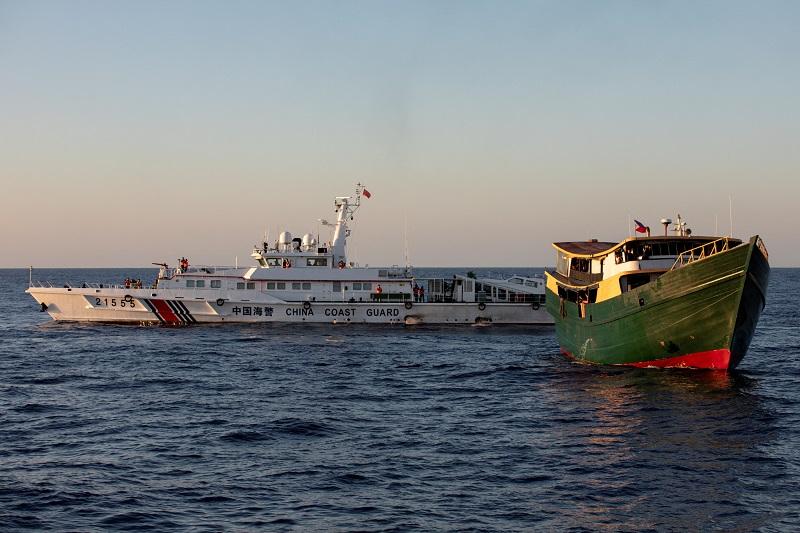PH policies will not affect China’s maritime rights –Chinese foreign ministry
Published April 1, 2024 3:03pm BEIJING/MANILA – A China foreign ministry spokesperson said on Monday that no matter what policies the Philippines rolls out, it cannot affect China’s sovereignty and maritime rights. Philippine President Ferdinand Marcos Jr ordered his government to strengthen its coordination on maritime security to confront “serious challenges” to territorial integrity and […]


BEIJING/MANILA – A China foreign ministry spokesperson said on Monday that no matter what policies the Philippines rolls out, it cannot affect China’s sovereignty and maritime rights.
Philippine President Ferdinand Marcos Jr ordered his government to strengthen its coordination on maritime security to confront “serious challenges” to territorial integrity and peace amid an escalating dispute with China over competing claims in the South China Sea.
Chinese foreign ministry spokesperson Wang Wenbin said China hopes the Philippines observes the commitments and consensus reached by both countries, and properly manages situations through negotiations.
GMA News Online contacted the Palace and the Armed Forces of the Philippines for comment but has yet to receive a reply as of posting time.
Marcos signed Executive Order No. 57 last week as he emphasized the need to strengthen maritime security and raise awareness on the maritime domain amid “serious challenges” threatening the Philippines’ territorial integrity and the “peaceful existence of Filipinos.”
“Despite efforts to promote stability and security in our maritime domain, the Philippines continues to confront a range of serious challenges that threaten not only the country’s territorial integrity, but also the peaceful existence of Filipinos, including their fundamental right to live in peace and freedom, free from fear of violence and threat,” Marcos said.
“Strengthening the country’s maritime security and domain awareness is imperative to comprehensively tackle the crosscutting issues that impact the nation’s national security, sovereignty, sovereign rights, and maritime jurisdiction over its extensive maritime zones,” he said.
Under EO 57, the National Coast Watch Council has been renamed and reorganized into the National Maritime Council (NMC) chaired by Executive Secretary Lucas Bersamin.
The NMC will be responsible for formulating policies and strategies to ensure a unified, coordinate and effective governance framework for the country’s maritime security and domain awareness, among other powers and functions.
Marcos ordered the strengthening of the country’s maritime security days after China Coast Guard (CCG) ships used water cannons on a Philippine vessel, the Unaizah May 4, carrying supplies for Filipino troops stationed at the BRP Sierra Madre in Ayungin Shoal in the West Philippine Sea.
A Philippine Coast Guard (PCG) vessel escorting the Unaizah May 4 was “impeded and encircled” by a CCG vessel and two Chinese militia ships on March 23.
The National Task Force for the West Philippine Sea slammed the CCG for the incident — the latest in a string of aggressive moves — which occurred in the waters of the Philippines’ exclusive economic zone.
However, CCG spokesperson Gan Yu claimed that the Philippines conducted an “irregular resupply mission.”
“It is a deliberate and provocative move that infringes upon China’s sovereignty and legitimate rights and interests and undermines peace and stability in the South China Sea. Despite repeated warnings and routing control by the Chinese side, the Filipino resupply ship tried to intrude into the adjacent waters of Ren’ai Jiao forcefully,” Gan said.
Gan said that the CCG implemented ”lawful regulation, interception, and expulsion in a reasonable and professional manner.”
The PCG on Sunday said that it will continue to have its presence seen in the West Philippine Sea, at the same time maintain peace in the area, amid China’s aggressive moves against Philippine vessels.
The Philippines, China, Taiwan, Vietnam, Malaysia, and Brunei have been embroiled in years-long territorial disputes over resource-rich features in the South China Sea, feared as Asia’s next potential flashpoint for a major armed conflict.
China claims the waters nearly in their entirety, despite a 2016 international tribunal ruling on a case filed by the Philippines that invalidated such an assertion. —Reuters/with a report from Llanesca T. Panti/KG, GMA Integrated News














